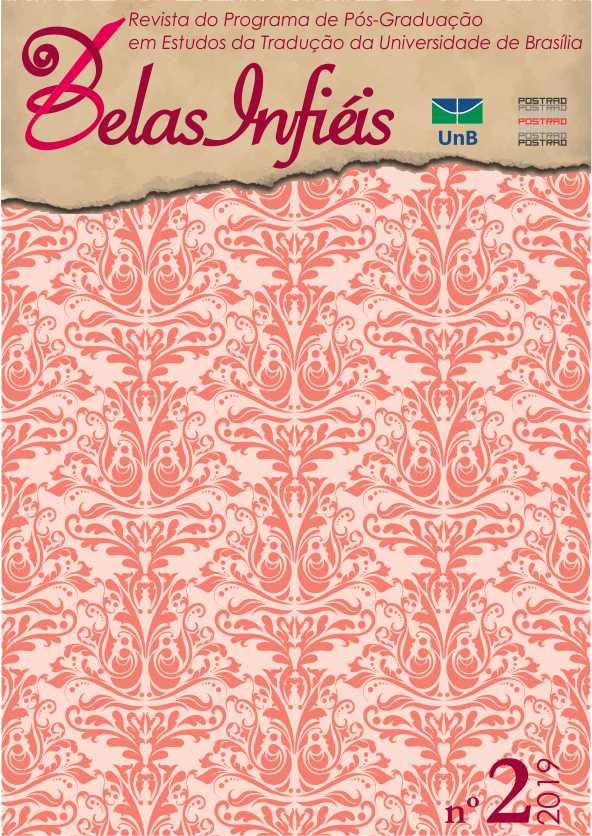Una presencia de antología. La traducción al español de la poesía de Kathleen Raine
DOI :
https://doi.org/10.26512/belasinfieis.v8.n2.2019.24382Mots-clés :
Traducción de poesía. Kathleen Raine. The Presence. Antologías (de traductor).Résumé
Este artículo tiene dos objetivos principales. Luego de revisar algunos de los problemas que caracterizan la traducción de poesía, se reseña, en primer lugar, la presencia poética de Kathleen Raine (1908-2003) en el ámbito de la traducción en español. En segundo lugar, sobre la base de un caso de estudio singular, se identifican las particularidades y desafíos que plantea la traducción de la poesía de Raine al español. En las letras hispanas, la voz poética de Raine se ve atravesada y constituida por una existencia de antología, lo cual le confiere un carácter necesariamente fragmentario, incompleto en su decir. Más aún, la fragmentariedad que implica toda antología se ve reflejada en las estrategias y técnicas que se ponen en juego en la traducción. A fin de corroborar nuestra hipótesis, el caso de estudio, constituido por la colección poética The Presence (RAINE, 1987), se centra en el examen pormenorizado de la traducción del poema “The Presence” al español, incluido en la antología Fragmentos de una visión sagrada (RAINE [Trad.: Alzueta Jesús], 2006). La consideración de la versión del poema en francés, incluida en la colección La Présence (RAINE [Trad.: Giraudon], 2003), ofrece un contrapunto de interés para ponderar las posibilidades expresivas de la traducción en el seno de dos lenguas romances. El análisis efectuado busca poner de relieve los procedimientos a través de los cuales se materializa el estilo distintivo de Raine y las técnicas desarrolladas para su recreación en el seno de la traducción.
Téléchargements
Téléchargements
Publié-e
Comment citer
Numéro
Rubrique
Licence
Copyright Statement
Given the public access to this journal, the texts are free to use but requires the recognition of the original authorship and initial publication in this journal to be properly stated.
The journal allows the use of works published for non-commercial purposes, including the right to submit the work to publicly accessible databases. Published contributions are the sole and exclusive responsibility of the author(s).
- When submitting papers to be evaluated by the Belas Infiéis journal, the author(s):
- Declare that the contents of the contributions are original and of their original creation, being entirely responsible for their content if there is an objection by third parties.
- Claim to be aware that they should not commit academic plagiarism.
- Declare that the manuscript has not been published, completely or partially, in Portuguese or another language. If it is a translation it should be submitted to the Translated Articles section.
- Declare that the manuscript is not being evaluated by other journals.
- Declare that the manuscript was not submitted to another journal simultaneously.
- Commit(s) to inform the journal of any kind of error or inaccuracy in their contribution (published, in evaluation or in editing) and to collaborate with the editors to make due corrections of the article (when in evaluation or editing) or erratum/retraction (after publication).
- Declare that there is no conflict of interest regarding the published work.
- Authorize its release if it is accepted for publication without any kind of monetary compensation.
- Agree to assign non-exclusive rights to publication to the magazine, remaining free to make their contribution available in other media as long as the publication of the first version in Belas Infiéis magazine is mentioned. They also authorize Belas Infiéis to assign their texts for reproduction in content indexers, virtual libraries and similar platforms.
- Maintain copyright and grant the journal the right of first publication, the work being licensed under theCreative Commons Attribution License.
- Is/Are allowed and encouraged to publish and distribute their work online after the editorial process, which may increase the impact and citation of the published work.
- Authorize the editorial team to make textual adjustments and to adapt the article to the publication rules, when necessary.



















